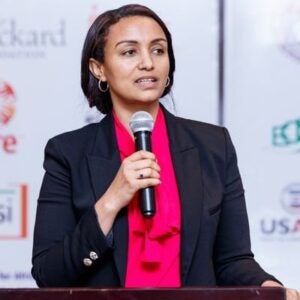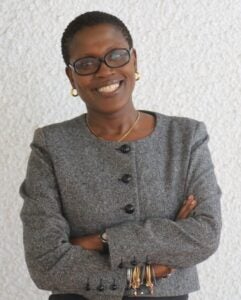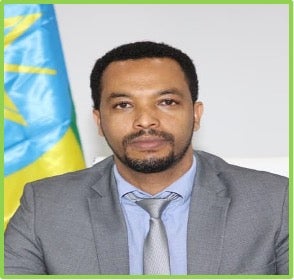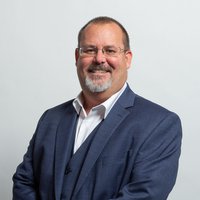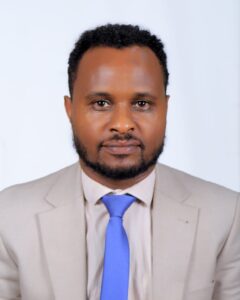We have the opportunity to host the following exceptional keynote speakers and panelists at the conference in February 2024.
Keynote Speakers
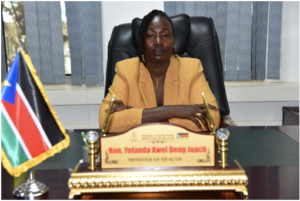 H.E. Yolanda Awel Deng has been serving as the Minister for Health in the Republic of South Sudan since March 2022. A former refugee and a trained psychologist and conflict resolution specialist, Hon. Deng has diverse experiences spanning Canada and South Sudan. Hon. Deng arrived in Canada as a refugee under the World University Service of Canada (WUSC) Scholarship Program in 2005. In 2009, she earned a Bachelor of Arts degree in Psychology from the University of Saskatchewan. Subsequently, Hon. Deng worked as a psychologist and in case management within the Ministry of Health of the State of Saskatchewan and several private health entities, delivering psychotherapeutic modalities to people in need before returning to her homeland of Southern Sudan in 2010. Back home, Hon. Deng served as a social and rehabilitation consultant for the Japan Center for Conflict Resolution in Juba, South Sudan. Her commitment to public service also led her to manage a USAID program and later, the assumption of the role of Executive Director of the Southern Sudan Referendum Bureau, where she played a pivotal role in overseeing the plebiscite that ultimately led to the independence of South Sudan. Realizing the need to resolve South Sudan’s conflict, Hon. Deng earned a Master of Arts in Conflict Analysis and Resolution from the Royal Road University in Vancouver, BC, in 2019. In furtherance of her dedication to public service, Hon. Deng became a Member of Parliament in the Transitional National Legislature of South Sudan. In addition, Hon. Deng represented the women bloc to the Eastern African regional body, the Intergovernmental Authority on Development (IGAD), in the peace negotiations that led to the current Government of National Unity, an illustration of her desire for durable peace in South Sudan. As the Minister for Health, Hon. Deng continues to bring her wealth of experience and commitment to the health of the citizens of South Sudan. She successfully steered South Sudan out of the COVID-19 pandemic and has been instrumental in the recent ascent of the South Sudan Social Health Insurance, among many other accomplishments. Throughout her illustrious career, she has received numerous accolades, including the prestigious Amnesty International Human Rights Activist Award and the Youth Leadership Award from Japan’s Center for Conflict Resolution. These honors underscore her commitments and contributions to human rights, conflict resolution, health and well-being of the vulnerable populations and the people of South Sudan.
H.E. Yolanda Awel Deng has been serving as the Minister for Health in the Republic of South Sudan since March 2022. A former refugee and a trained psychologist and conflict resolution specialist, Hon. Deng has diverse experiences spanning Canada and South Sudan. Hon. Deng arrived in Canada as a refugee under the World University Service of Canada (WUSC) Scholarship Program in 2005. In 2009, she earned a Bachelor of Arts degree in Psychology from the University of Saskatchewan. Subsequently, Hon. Deng worked as a psychologist and in case management within the Ministry of Health of the State of Saskatchewan and several private health entities, delivering psychotherapeutic modalities to people in need before returning to her homeland of Southern Sudan in 2010. Back home, Hon. Deng served as a social and rehabilitation consultant for the Japan Center for Conflict Resolution in Juba, South Sudan. Her commitment to public service also led her to manage a USAID program and later, the assumption of the role of Executive Director of the Southern Sudan Referendum Bureau, where she played a pivotal role in overseeing the plebiscite that ultimately led to the independence of South Sudan. Realizing the need to resolve South Sudan’s conflict, Hon. Deng earned a Master of Arts in Conflict Analysis and Resolution from the Royal Road University in Vancouver, BC, in 2019. In furtherance of her dedication to public service, Hon. Deng became a Member of Parliament in the Transitional National Legislature of South Sudan. In addition, Hon. Deng represented the women bloc to the Eastern African regional body, the Intergovernmental Authority on Development (IGAD), in the peace negotiations that led to the current Government of National Unity, an illustration of her desire for durable peace in South Sudan. As the Minister for Health, Hon. Deng continues to bring her wealth of experience and commitment to the health of the citizens of South Sudan. She successfully steered South Sudan out of the COVID-19 pandemic and has been instrumental in the recent ascent of the South Sudan Social Health Insurance, among many other accomplishments. Throughout her illustrious career, she has received numerous accolades, including the prestigious Amnesty International Human Rights Activist Award and the Youth Leadership Award from Japan’s Center for Conflict Resolution. These honors underscore her commitments and contributions to human rights, conflict resolution, health and well-being of the vulnerable populations and the people of South Sudan.
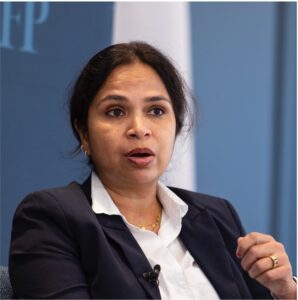 Professor Padmashree Gehl Sampath is the Chief Executive Officer of the African Pharmaceutical Technology Foundation, a new regional African institution in Kigali, Rwanda. She is also the Senior Advisor on Pharmaceuticals and Health to the President, of the African Development Bank. Professor Gehl Sampath is a well-respected thought leader in the field of development studies and global health, working on current challenges predominantly from a trade, technology and industrialization perspective She has served as the Senior Scientific Advisor to the Africa Centresfor Disease Control (Africa CDC), leading the work on a market shaping and pooled procurement system for Africa at the AU level. Since 2021, she has also worked with the African Development Bank Group on the Bank’s Pharma Sector Strategy for Africa, and served as the Chairperson of the Technical Advisory Group of the COVID-19 Technology Access Pool (CTAP) of the World Health Organisation contributing with her expertise on technology transfer and technology licensing. She is an Honorary Professor at the University of Rwanda, and a Visiting Professor at the University of Johannesburg, where she leads a large regional programmefocused on building regional centres’ of excellence for vaccine production in Africa. She is also a member of the Trade and Industrial Development Advisory Council of the African Continental Free Trade Area.
Professor Padmashree Gehl Sampath is the Chief Executive Officer of the African Pharmaceutical Technology Foundation, a new regional African institution in Kigali, Rwanda. She is also the Senior Advisor on Pharmaceuticals and Health to the President, of the African Development Bank. Professor Gehl Sampath is a well-respected thought leader in the field of development studies and global health, working on current challenges predominantly from a trade, technology and industrialization perspective She has served as the Senior Scientific Advisor to the Africa Centresfor Disease Control (Africa CDC), leading the work on a market shaping and pooled procurement system for Africa at the AU level. Since 2021, she has also worked with the African Development Bank Group on the Bank’s Pharma Sector Strategy for Africa, and served as the Chairperson of the Technical Advisory Group of the COVID-19 Technology Access Pool (CTAP) of the World Health Organisation contributing with her expertise on technology transfer and technology licensing. She is an Honorary Professor at the University of Rwanda, and a Visiting Professor at the University of Johannesburg, where she leads a large regional programmefocused on building regional centres’ of excellence for vaccine production in Africa. She is also a member of the Trade and Industrial Development Advisory Council of the African Continental Free Trade Area.
Panelists
Women in Health: Strengthening Leadership and Inclusion
 Rebeca Gyumi is a Tanzanian girls’ rights activist and lawyer who is known for her advocacy work on ending child marriages in Tanzania. She is the Founder and Executive Director of the Msichana Initiative, a non-governmental organization which promotes girls’ access to education and empowerment. The organization uses the power of girls’ agency and policy advocacy to advance girls’ rights. In 2016, Gyumi filed a petition challenging Tanzania’s Marriage Act of 1971, which allowed girls as young as 14 to get married with parental consent, and asked the court to raise the minimum age of marriage to 18 for both boys and girls. Which led to a landmark ruling in 2019 when the Court of Appeal ruled in her favor and ordered the Government to amend the law and raise the minimum age to 18. Gyumi’s work has been recognized regionally and internationally, including being awarded the 2018 UN Human Rights Prize and named in the 2019 Most Influential People in Gender Policy. Rebeca sits on various boards at national and international level, including the Co-Impact, Gender Fund Advisory Board and Legal and Human Rights Centre. She continues to advocate for girls’ right to education and promote gender sensitive approaches in Tanzania and beyond.
Rebeca Gyumi is a Tanzanian girls’ rights activist and lawyer who is known for her advocacy work on ending child marriages in Tanzania. She is the Founder and Executive Director of the Msichana Initiative, a non-governmental organization which promotes girls’ access to education and empowerment. The organization uses the power of girls’ agency and policy advocacy to advance girls’ rights. In 2016, Gyumi filed a petition challenging Tanzania’s Marriage Act of 1971, which allowed girls as young as 14 to get married with parental consent, and asked the court to raise the minimum age of marriage to 18 for both boys and girls. Which led to a landmark ruling in 2019 when the Court of Appeal ruled in her favor and ordered the Government to amend the law and raise the minimum age to 18. Gyumi’s work has been recognized regionally and internationally, including being awarded the 2018 UN Human Rights Prize and named in the 2019 Most Influential People in Gender Policy. Rebeca sits on various boards at national and international level, including the Co-Impact, Gender Fund Advisory Board and Legal and Human Rights Centre. She continues to advocate for girls’ right to education and promote gender sensitive approaches in Tanzania and beyond.
Dr. Meseret Zelalem Tadesse is a senior paediatrician, advocate for the women, child and girls and youths health with more than 15 years of technical and managerial experience in design, implementation and monitoring of maternal and child health, and nutrition programs at global, national and district levels. Experienced in health system and program management with managerial and technical skills in project management, policy and strategy development, and systems strengthening. Starting from 2018 to present, former chief of staff for the office of the Minister, later Director Maternal, Child Health and Nutrition Directorate, currently she is the Lead Excutive of Maternal ,Child and Adolescent Health, programs at Federal Ministry of Health of Ethiopia (FMoH). Dr. Meseret has received awards of exemplary on leadership. She has a role in different advisory and member of national, regional and global steering committee to mention few GAVI Zero Dose steering committee Currently, Dr. Meseret is Co-investigator of the following projects; Saving Little Lives (SLL) project, a large scale project funded by the Global Financing Facility and coordinated by UNICEF Ethiopia. Implementation Research to Scale-up and Evaluate the Impact of Antenatal Corticosteroids on Preterm Newborn Outcomes: a multi-country implementation research. 2022 – 2027 (Funded by BMGF and coordinated by World Health Organization) Implementation research to accelerate scale-up of specialized lactation support to optimize breast milk feeding practices and nutritional outcomes among preterm and/or low-birth-weight infants, Ethiopia (Funded by BMGF and coordinated by Addis Ababa University) Implementation research to accelerated scale-up of immediate Kangaroo Mother Care in Ethiopia: a multi-center implementation research. 2023 – 2026 (Funded by BMGF and coordinated by World Health Organization).
 H.E. Yolanda Awel Deng has been serving as the Minister for Health in the Republic of South Sudan since March 2022. A former refugee and a trained psychologist and conflict resolution specialist, Hon. Deng has diverse experiences spanning Canada and South Sudan. Hon. Deng arrived in Canada as a refugee under the World University Service of Canada (WUSC) Scholarship Program in 2005. In 2009, she earned a Bachelor of Arts degree in Psychology from the University of Saskatchewan. Subsequently, Hon. Deng worked as a psychologist and in case management within the Ministry of Health of the State of Saskatchewan and several private health entities, delivering psychotherapeutic modalities to people in need before returning to her homeland of Southern Sudan in 2010. Back home, Hon. Deng served as a social and rehabilitation consultant for the Japan Center for Conflict Resolution in Juba, South Sudan. Her commitment to public service also led her to manage a USAID program and later, the assumption of the role of Executive Director of the Southern Sudan Referendum Bureau, where she played a pivotal role in overseeing the plebiscite that ultimately led to the independence of South Sudan. Realizing the need to resolve South Sudan’s conflict, Hon. Deng earned a Master of Arts in Conflict Analysis and Resolution from the Royal Road University in Vancouver, BC, in 2019. In furtherance of her dedication to public service, Hon. Deng became a Member of Parliament in the Transitional National Legislature of South Sudan. In addition, Hon. Deng represented the women bloc to the Eastern African regional body, the Intergovernmental Authority on Development (IGAD), in the peace negotiations that led to the current Government of National Unity, an illustration of her desire for durable peace in South Sudan. As the Minister for Health, Hon. Deng continues to bring her wealth of experience and commitment to the health of the citizens of South Sudan. She successfully steered South Sudan out of the COVID-19 pandemic and has been instrumental in the recent ascent of the South Sudan Social Health Insurance, among many other accomplishments. Throughout her illustrious career, she has received numerous accolades, including the prestigious Amnesty International Human Rights Activist Award and the Youth Leadership Award from Japan’s Center for Conflict Resolution. These honors underscore her commitments and contributions to human rights, conflict resolution, health and well-being of the vulnerable populations and the people of South Sudan.
H.E. Yolanda Awel Deng has been serving as the Minister for Health in the Republic of South Sudan since March 2022. A former refugee and a trained psychologist and conflict resolution specialist, Hon. Deng has diverse experiences spanning Canada and South Sudan. Hon. Deng arrived in Canada as a refugee under the World University Service of Canada (WUSC) Scholarship Program in 2005. In 2009, she earned a Bachelor of Arts degree in Psychology from the University of Saskatchewan. Subsequently, Hon. Deng worked as a psychologist and in case management within the Ministry of Health of the State of Saskatchewan and several private health entities, delivering psychotherapeutic modalities to people in need before returning to her homeland of Southern Sudan in 2010. Back home, Hon. Deng served as a social and rehabilitation consultant for the Japan Center for Conflict Resolution in Juba, South Sudan. Her commitment to public service also led her to manage a USAID program and later, the assumption of the role of Executive Director of the Southern Sudan Referendum Bureau, where she played a pivotal role in overseeing the plebiscite that ultimately led to the independence of South Sudan. Realizing the need to resolve South Sudan’s conflict, Hon. Deng earned a Master of Arts in Conflict Analysis and Resolution from the Royal Road University in Vancouver, BC, in 2019. In furtherance of her dedication to public service, Hon. Deng became a Member of Parliament in the Transitional National Legislature of South Sudan. In addition, Hon. Deng represented the women bloc to the Eastern African regional body, the Intergovernmental Authority on Development (IGAD), in the peace negotiations that led to the current Government of National Unity, an illustration of her desire for durable peace in South Sudan. As the Minister for Health, Hon. Deng continues to bring her wealth of experience and commitment to the health of the citizens of South Sudan. She successfully steered South Sudan out of the COVID-19 pandemic and has been instrumental in the recent ascent of the South Sudan Social Health Insurance, among many other accomplishments. Throughout her illustrious career, she has received numerous accolades, including the prestigious Amnesty International Human Rights Activist Award and the Youth Leadership Award from Japan’s Center for Conflict Resolution. These honors underscore her commitments and contributions to human rights, conflict resolution, health and well-being of the vulnerable populations and the people of South Sudan.
 Dr. Emmanuella Amoako is a practicing physician with 13 years of extensive experience in various clinical settings. She is currently a Paediatric Oncology Fellow at the Korle Bu Teaching Hospital. She also manages collaborations and leads clinical research projects at Yemaachi Biotech, an African Cancer Research company. As researcher, she has contributed to several impactful publications.Her commitment to patients extends beyond medicine, as she authors children’s books to foster resilience amongst young patients living with chronic diseases. Recognized with prestigious awards, including the Johnson and Johnson Young Health Leader Award, she continues to impact lives through medical missions and patient advocacy.
Dr. Emmanuella Amoako is a practicing physician with 13 years of extensive experience in various clinical settings. She is currently a Paediatric Oncology Fellow at the Korle Bu Teaching Hospital. She also manages collaborations and leads clinical research projects at Yemaachi Biotech, an African Cancer Research company. As researcher, she has contributed to several impactful publications.Her commitment to patients extends beyond medicine, as she authors children’s books to foster resilience amongst young patients living with chronic diseases. Recognized with prestigious awards, including the Johnson and Johnson Young Health Leader Award, she continues to impact lives through medical missions and patient advocacy.
Health priorities: Addressing the double disease burden in Africa
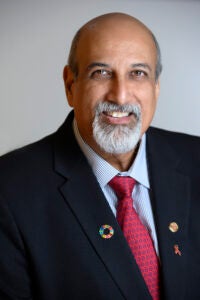 Dr. Salim S. Abdool Karim, FRS is a South African clinical infectious diseases epidemiologist widely recognized for scientific contributions and leadership in AIDS and Covid-19. He is Director of the Centre for the AIDS Programme of Research in South Africa (CAPRISA), Durban, and Professor of Global Health at Columbia University, New York. He serves as Special Advisor on pandemics to the Director-General of the WHO. He is an adjunct Professor of Immunology and Infectious Diseases at Harvard University, adjunct Professor of Medicine at Cornell University and Pro Vice-Chancellor (Research) at the University of KwaZulu-Natal. He previously served as President of the South African Medical Research Council. He is a member of the WHO Science Council and Vice-President of the International Science Council. He serves on the Boards of the New England Journal of Medicine, Lancet Global Health and Lancet HIV. His many awards include the Canada Gairdner Award, VinFuture Prize, Japan’s Hideyo Noguchi Africa Prize and the African Union’s Kwame Nkrumah Prize, the highest award for research in Africa. He is the author of the book, “Standing up for Science”. He is a member of the US National Academy of Medicine and the American Academy of Microbiology. He is a Fellow of the Royal Society.
Dr. Salim S. Abdool Karim, FRS is a South African clinical infectious diseases epidemiologist widely recognized for scientific contributions and leadership in AIDS and Covid-19. He is Director of the Centre for the AIDS Programme of Research in South Africa (CAPRISA), Durban, and Professor of Global Health at Columbia University, New York. He serves as Special Advisor on pandemics to the Director-General of the WHO. He is an adjunct Professor of Immunology and Infectious Diseases at Harvard University, adjunct Professor of Medicine at Cornell University and Pro Vice-Chancellor (Research) at the University of KwaZulu-Natal. He previously served as President of the South African Medical Research Council. He is a member of the WHO Science Council and Vice-President of the International Science Council. He serves on the Boards of the New England Journal of Medicine, Lancet Global Health and Lancet HIV. His many awards include the Canada Gairdner Award, VinFuture Prize, Japan’s Hideyo Noguchi Africa Prize and the African Union’s Kwame Nkrumah Prize, the highest award for research in Africa. He is the author of the book, “Standing up for Science”. He is a member of the US National Academy of Medicine and the American Academy of Microbiology. He is a Fellow of the Royal Society.
Dr. Julie Makani is a Physician Scientist in the Department of Haematology and Blood Transfusion at Muhimbili University of Health and Allied Sciences (MUHAS) www.muhas.ac.tz and Provost Visiting Professor at Imperial College London https://www.imperial.ac.uk/people/j.makani. Tanzania established, in 2003, one of the world’s largest single-center cohorts for sickle cell disease at Muhimbili National Hospital (MNH) https://www.mnh.or.tz, in a programme, CHARTA, that integrates coordination, health, advocacy, research and training in Africa. Prof Makani serves as Principal Investigator of the Sickle Cell programme in MUHAS and Sickle Pan African Research Consortium (SPARCO) Clinical Coordinating Centre (CCC) within SickleInAfrica network http://www.sickleinafrica.org/. She is Site Principal Investigator for MUHAS for H3ABioNet https://www.h3abionet.org/; Co- Principal Investigator SickleGenAfrica http://sicklegenafrica.com/. Her work aims to use sickle cell disease as a model to establish scientific and healthcare solutions in Africa, that are locally relevant and globally significant. The approach integrates public health interventions with genomics including gene therapy to improve health and cure sickle cell disease. Professor Makani (MD, PhD, FRCP, FTAAS) trained in Medicine (Tanzania), specialized in Internal Medicine (UK), and completed her PhD in clinical epidemiology of sickle cell disease (UK). She was a Wellcome Trust Research Fellow [Training 2003 – 2009; Intermediate 2012 – 2017], Tutu Leadership Fellow (2009) www.alinstitute.org and Honorary Visiting Research Fellow, University of Oxford (2003 – 2016). She received the 2011 Royal Society Africa Award http://www.youtube.com/watch?v=sd17odE1YLs on the application of genomic research to improve health and find a cure for sickle cell disease. She is a Fellow of the Royal College of Physicians of UK and Fellow of the Tanzania Academy of Sciences.
Dr. Dereje Duguma Gemeda is state minister for the program wing at the Federal Democratic Republic of Ethiopia, appointed since March 2020 and has been at the forefront of the country’s COVID 19 pandemic surveillance prevention and care and treatment responses. In addition, as part of this role Dr. Dereje is leading to maintain, restore and strengthen post pandemic health services in the sector. Prior to this appointment, He served in Ormoia regional health bureau for six years at different position including Monitoring evaluation and planning director, deputy regional bureau head and regional health bureau head. During his leadership at Oromia regional health bureau Dr. Dereje was leading the implementation of the Oromia health programmes as part of the National Health Sector Transformation Strategy. With over 10 years of experience, Dr Dereje is a physician who has served in rural hospitals and letter specialised in public health in Italy with experience as a clinician, academician, and public health leader. Dr. Dereje is passionate and advocator of public health interventions and health system reforms, and he has received many awards including gold medal from Mekelle University during his undergraduate studies and others honours from local and international organizations for his outstanding leadership at regional health bureau and Federal ministry of health. In addition to his services at government structure, Dr. Degree is also chair and board member of a number of government and private institutions.
 Dr. Kalé Kponee-Shovein is an epidemiologist and environmental health scientist at Analysis Group, Inc. with analytical experience in climate policy research, environmental health research, causal inference methods, outcomes research, drug safety, predictive analytics, and healthcare litigation. Dr. Kponee-Shovein has expertise in applying novel and advanced methodologies to address complex healthcare challenges. She has developed and executed research projects assessing the consequences of environmental pollution in Nigeria. Dr. Kponee-Shovein has also developed and published global theoretical models elucidating on novel approaches for accelerating healthcare decarbonization across diverse healthcare settings. She has provided regulatory and strategic consulting on drug registration and real-world evidence generation for regulatory submissions. Dr. Kponee-Shovein is a founder of the Kponee-Shovein Foundation, which exists to provide financial assistance to university scholars and small business owners in Nigeria and access to clean water across communities in Rivers State, Nigeria. She received joint Doctor of Science degrees in Epidemiology and Environmental Health Sciences from Harvard University. Dr. Kponee-Shovein is currently an adjunct senior lecturer in the epidemiology department at the Harvard T.H. Chan School of Public Health.
Dr. Kalé Kponee-Shovein is an epidemiologist and environmental health scientist at Analysis Group, Inc. with analytical experience in climate policy research, environmental health research, causal inference methods, outcomes research, drug safety, predictive analytics, and healthcare litigation. Dr. Kponee-Shovein has expertise in applying novel and advanced methodologies to address complex healthcare challenges. She has developed and executed research projects assessing the consequences of environmental pollution in Nigeria. Dr. Kponee-Shovein has also developed and published global theoretical models elucidating on novel approaches for accelerating healthcare decarbonization across diverse healthcare settings. She has provided regulatory and strategic consulting on drug registration and real-world evidence generation for regulatory submissions. Dr. Kponee-Shovein is a founder of the Kponee-Shovein Foundation, which exists to provide financial assistance to university scholars and small business owners in Nigeria and access to clean water across communities in Rivers State, Nigeria. She received joint Doctor of Science degrees in Epidemiology and Environmental Health Sciences from Harvard University. Dr. Kponee-Shovein is currently an adjunct senior lecturer in the epidemiology department at the Harvard T.H. Chan School of Public Health.
Trad Hatton is PATH’s country director for the Democratic Republic of the Congo (DRC). He has also served as chief of party and director for the USAID-funded integrated HIV/AIDS prevention program (ProVIC+). Mr. Hatton has more than 15 years of experience working in the field on HIV/AIDS projects throughout sub-Saharan Africa, much of it focused in the DRC. His leadership practice and technical knowledge include capacity building, organizational development, financial oversight, and community mobilization.
Health financing: Supporting Africa’s health priorities for the next decade
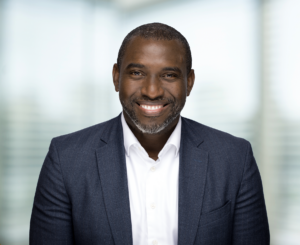 Dr. Obinna Onyekwena, currently serving as Deputy Director, Infectious Diseases Advocacy at the Bill and Melinda Gates Foundation, is a renowned expert in global health, particularly in the realm of health financing. At the foundation, he leads initiatives on infectious diseases, focusing on strategic policy and advocacy. With a robust background in medicine and public health and a career spanning multiple continents, he has contributed significantly to infectious disease programs worldwide, particularly major pandemics like Malaria, TB and HIV. He has worked on the development and implementation of innovative financing models, including in the African context, to enhance healthcare delivery and impact. Dr. Onyekwena’ s experience with the Global Fund and various leadership roles in the public and private sectors demonstrates his commitment to advancing health financing policy. His academic credentials include a Bachelor of Medicine and Surgery from the University of Nigeria and a Master of Science in Public Health from the London School of Hygiene and Tropical Medicine.
Dr. Obinna Onyekwena, currently serving as Deputy Director, Infectious Diseases Advocacy at the Bill and Melinda Gates Foundation, is a renowned expert in global health, particularly in the realm of health financing. At the foundation, he leads initiatives on infectious diseases, focusing on strategic policy and advocacy. With a robust background in medicine and public health and a career spanning multiple continents, he has contributed significantly to infectious disease programs worldwide, particularly major pandemics like Malaria, TB and HIV. He has worked on the development and implementation of innovative financing models, including in the African context, to enhance healthcare delivery and impact. Dr. Onyekwena’ s experience with the Global Fund and various leadership roles in the public and private sectors demonstrates his commitment to advancing health financing policy. His academic credentials include a Bachelor of Medicine and Surgery from the University of Nigeria and a Master of Science in Public Health from the London School of Hygiene and Tropical Medicine.
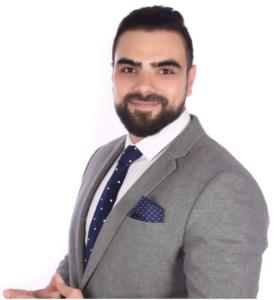 Dr. Moustafa Abdalla, an Egyptian National, is a Senior Health Economist at the World Bank with more than 15 years of experience in service delivery, health policy and financing, and health system analysis in low-, middle-, and high-income countries in MENA, Africa, and South Asia regions. He has been leading the World Bank’s health sector engagement and human development agenda in Eastern and Southern Africa region. Further, Dr. Abdalla has led/co-led several analytical pieces on service delivery in fragile contexts, health system analysis, health financing policy recommendations in several countries. Prior to the Bank, he worked in organizations such as the Islamic Development Bank (IsDB), WHO, MSF, and the Ministry of Health in Egypt. He also served as a visiting lecturer in the American University in Cairo and Cairo University on topics related to Health sector reform and Health financing. Dr. Abdalla holds a medical degree and has a master’s degree in health care management from Harvard University, and a master’s degree in public health (health economics) from the London School of Hygiene and Tropical Medicine.
Dr. Moustafa Abdalla, an Egyptian National, is a Senior Health Economist at the World Bank with more than 15 years of experience in service delivery, health policy and financing, and health system analysis in low-, middle-, and high-income countries in MENA, Africa, and South Asia regions. He has been leading the World Bank’s health sector engagement and human development agenda in Eastern and Southern Africa region. Further, Dr. Abdalla has led/co-led several analytical pieces on service delivery in fragile contexts, health system analysis, health financing policy recommendations in several countries. Prior to the Bank, he worked in organizations such as the Islamic Development Bank (IsDB), WHO, MSF, and the Ministry of Health in Egypt. He also served as a visiting lecturer in the American University in Cairo and Cairo University on topics related to Health sector reform and Health financing. Dr. Abdalla holds a medical degree and has a master’s degree in health care management from Harvard University, and a master’s degree in public health (health economics) from the London School of Hygiene and Tropical Medicine.
 Nafisa Jiwani is the Managing Director for Global Health Initiatives at the U.S. International Development Finance Corporation (DFC), America’s development bank. As a Managing Director, Ms. Jiwani serves as a senior policy adviser for the agency, providing guidance and leadership on policy and transactional matters focused on Global Health. Additionally, Nafisa is spearheading DFC’s Health and Prosperity Initiative, which seeks to mobilize capital to strengthen health systems and improve resilience in developing countries. Prior to joining the agency, Nafisa served as the Deputy Senior Advisor to the Secretary of Health and Human Services on Value-Based Care where she led strategic department-wide priorities on maternal morbidity and mortality, sepsis and kidney care, social determinants of health and artificial intelligence/predictive analytics. Before taking her role at HHS, Nafisa worked at the Centers for Disease Control and Prevention (CDC) as a Team Lead for Policy and Partnerships in the Office of the Associate Director for Policy and Strategy. During her time at CDC, she focused her efforts on health systems transformation and was responsible for translating evidence into payment policy. Ms. Jiwani’s previous experience includes work in the the fields of international development, psychoneuroendocrine research, youth development and newborn screening translational research. Nafisa earned a Bachelor of Arts degree in Psychology from Southern Methodist University and a Master of Public Health in Management and Policy degree from the Rollins School of Public Health, Emory University.
Nafisa Jiwani is the Managing Director for Global Health Initiatives at the U.S. International Development Finance Corporation (DFC), America’s development bank. As a Managing Director, Ms. Jiwani serves as a senior policy adviser for the agency, providing guidance and leadership on policy and transactional matters focused on Global Health. Additionally, Nafisa is spearheading DFC’s Health and Prosperity Initiative, which seeks to mobilize capital to strengthen health systems and improve resilience in developing countries. Prior to joining the agency, Nafisa served as the Deputy Senior Advisor to the Secretary of Health and Human Services on Value-Based Care where she led strategic department-wide priorities on maternal morbidity and mortality, sepsis and kidney care, social determinants of health and artificial intelligence/predictive analytics. Before taking her role at HHS, Nafisa worked at the Centers for Disease Control and Prevention (CDC) as a Team Lead for Policy and Partnerships in the Office of the Associate Director for Policy and Strategy. During her time at CDC, she focused her efforts on health systems transformation and was responsible for translating evidence into payment policy. Ms. Jiwani’s previous experience includes work in the the fields of international development, psychoneuroendocrine research, youth development and newborn screening translational research. Nafisa earned a Bachelor of Arts degree in Psychology from Southern Methodist University and a Master of Public Health in Management and Policy degree from the Rollins School of Public Health, Emory University.
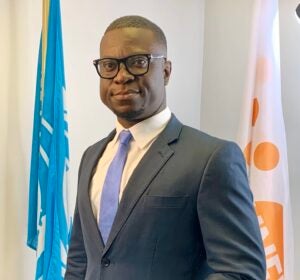 Sydney Hushie is a Regional Innovation Specialist for UNFPA in the East and Southern Africa Region where he leads digitalization and innovation mainstreaming to accelerate programme efficiency and impact. Before joining the UNFPA, he was the Coordinator of the African Education Fund at the African Development Bank – a $300 million fund aimed at providing financing for education, science, technology and innovation led by Africa for Africa. Sydney has spent over 15 years supporting innovation ecosystem and community resilience building working with young people. Sydney Hushie worked with the British Council developing social innovation ecosystems through empowering young people across Africa. Sydney has a passion for technology and ecosystems. Sydney holds a Masters Degree in International Law from the University of Cumbria, UK and a bachelors in Economics from the Central University, Ghana.
Sydney Hushie is a Regional Innovation Specialist for UNFPA in the East and Southern Africa Region where he leads digitalization and innovation mainstreaming to accelerate programme efficiency and impact. Before joining the UNFPA, he was the Coordinator of the African Education Fund at the African Development Bank – a $300 million fund aimed at providing financing for education, science, technology and innovation led by Africa for Africa. Sydney has spent over 15 years supporting innovation ecosystem and community resilience building working with young people. Sydney Hushie worked with the British Council developing social innovation ecosystems through empowering young people across Africa. Sydney has a passion for technology and ecosystems. Sydney holds a Masters Degree in International Law from the University of Cumbria, UK and a bachelors in Economics from the Central University, Ghana.
Drugs & vaccines: Strengthening local supply chains, manufacturing & innovation
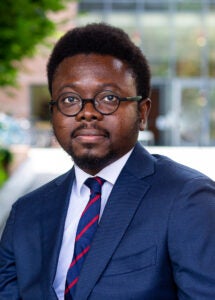 Adebayo ‘Ade’ Alonge is a pharmacist with academic degrees & training in policy, business, finance, and ecosystem engineering from Harvard, Yale, and MIT. After surviving a coma from a fake drug, he founded RxAll to enable access to affordable high quality and authenticated medicines across Africa. 5K+ pharmacies across Nigeria, Kenya, and Uganda use the RxAll digital infrastructure to run their pharmacies and provide primary care- carrying out important functions such as instant drug quality assurance, end to end pharmacy automation, collecting health insurance claims, providing telemedicine, and accessing financing for procurement. Medicines and other healthcare services are exchanged on the RxAll platform, reaching over 2.5 million patients monthly. Ade continues to lead RxAll’s expansion across Africa and aims to maximize RxAll’s impact across all the countries it is currently active in, with the goal of ensuring access to affordable high-quality medicines and healthcare for all Africans.
Adebayo ‘Ade’ Alonge is a pharmacist with academic degrees & training in policy, business, finance, and ecosystem engineering from Harvard, Yale, and MIT. After surviving a coma from a fake drug, he founded RxAll to enable access to affordable high quality and authenticated medicines across Africa. 5K+ pharmacies across Nigeria, Kenya, and Uganda use the RxAll digital infrastructure to run their pharmacies and provide primary care- carrying out important functions such as instant drug quality assurance, end to end pharmacy automation, collecting health insurance claims, providing telemedicine, and accessing financing for procurement. Medicines and other healthcare services are exchanged on the RxAll platform, reaching over 2.5 million patients monthly. Ade continues to lead RxAll’s expansion across Africa and aims to maximize RxAll’s impact across all the countries it is currently active in, with the goal of ensuring access to affordable high-quality medicines and healthcare for all Africans.
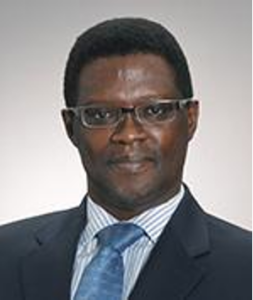 Dr. Christopher da Costa, who hails from The Gambia, is US licensed board-certified physician, infectious disease immunologist, and vaccine and immunotherapeutics development subject matter expert. He has most recently led teams of scientists and other professionals providing technical support for research and development to various vaccine development and manufacturing organizations at the Coalition for Epidemic Preparedness Innovations (CEPI. He has over 15 years’ prior experience in the pharmaceutical and biotechnology industries in end-to-end vaccine and drug development that includes expertise spanning preclinical to late stage and post-licensure activities, in addition to many years’ experience as a practicing physician. His research interests include Sustainable Manufacturing of Vaccines and other Pharmaceutical Countermeasures within LMICs to combat endemic and pre-emergent infectious diseases, including those with pandemic potential. He obtained his undergraduate and medical degrees at the University of Zambia, MSc (Tropical Medicine) and PhD (Immunology) degrees at the London School of Hygiene & Tropical Medicine, a Physicians’ executive MBA degree focused on healthcare management and comparative healthcare systems, at Auburn University. He is an alumnus of the Global Healthcare Leaders Program (GHLP) of Harvard Medical School, and currently a Takemi International Health Fellow at the Harvard T.H. Chan.
Dr. Christopher da Costa, who hails from The Gambia, is US licensed board-certified physician, infectious disease immunologist, and vaccine and immunotherapeutics development subject matter expert. He has most recently led teams of scientists and other professionals providing technical support for research and development to various vaccine development and manufacturing organizations at the Coalition for Epidemic Preparedness Innovations (CEPI. He has over 15 years’ prior experience in the pharmaceutical and biotechnology industries in end-to-end vaccine and drug development that includes expertise spanning preclinical to late stage and post-licensure activities, in addition to many years’ experience as a practicing physician. His research interests include Sustainable Manufacturing of Vaccines and other Pharmaceutical Countermeasures within LMICs to combat endemic and pre-emergent infectious diseases, including those with pandemic potential. He obtained his undergraduate and medical degrees at the University of Zambia, MSc (Tropical Medicine) and PhD (Immunology) degrees at the London School of Hygiene & Tropical Medicine, a Physicians’ executive MBA degree focused on healthcare management and comparative healthcare systems, at Auburn University. He is an alumnus of the Global Healthcare Leaders Program (GHLP) of Harvard Medical School, and currently a Takemi International Health Fellow at the Harvard T.H. Chan.
 Sofia Radley-Searle is the Co-Founder and Chief Operating Officer of AxmedRx. From a very young age and through family experience, she decided she would build a career that could help patients live healthier lives, especially those in areas where access to therapies was most challenging. During her Pharmacy School years, she undertook several research projects to work on developing new therapeutic assets, but she also spent most of her free time as a volunteer pharmacist in India, Guatemala, and El Salvador. While helping local clinical teams deliver the care and the medicines patients needed in the most underserved areas of these countries, she experienced firsthand the burden caused by a fragmented and unfair access to medicines system. Sofia then spent 7 years in the pharmaceutical sector. She first joined GSK’s Future Leaders Program after which she transitioned into a diverse set of local and global commercial roles. From sales leadership to global and local marketing lead roles, she was able to see the important role the pharmaceutical industry plays in bringing therapies to market, as well as some of the market failure dynamics sustaining the inequalities still present when patients try to access live saving medicines around the world. She decided to leave the industry to work on improving this issue. While earning her MBA degree at Harvard Business School she met her two co-founders and started AxmedRx. Sofia earned her M. Pharm degree at Universidad CEU San Pablo, graduating as #1 of her class. She is currently finishing her Master’s in Business Administration at Harvard Business School. She is a mother of two boys, Leonardo and Mateo.
Sofia Radley-Searle is the Co-Founder and Chief Operating Officer of AxmedRx. From a very young age and through family experience, she decided she would build a career that could help patients live healthier lives, especially those in areas where access to therapies was most challenging. During her Pharmacy School years, she undertook several research projects to work on developing new therapeutic assets, but she also spent most of her free time as a volunteer pharmacist in India, Guatemala, and El Salvador. While helping local clinical teams deliver the care and the medicines patients needed in the most underserved areas of these countries, she experienced firsthand the burden caused by a fragmented and unfair access to medicines system. Sofia then spent 7 years in the pharmaceutical sector. She first joined GSK’s Future Leaders Program after which she transitioned into a diverse set of local and global commercial roles. From sales leadership to global and local marketing lead roles, she was able to see the important role the pharmaceutical industry plays in bringing therapies to market, as well as some of the market failure dynamics sustaining the inequalities still present when patients try to access live saving medicines around the world. She decided to leave the industry to work on improving this issue. While earning her MBA degree at Harvard Business School she met her two co-founders and started AxmedRx. Sofia earned her M. Pharm degree at Universidad CEU San Pablo, graduating as #1 of her class. She is currently finishing her Master’s in Business Administration at Harvard Business School. She is a mother of two boys, Leonardo and Mateo.
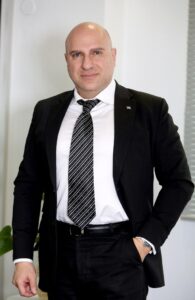 Dr. Stavros Nicolaou is the Aspen Pharmacare Group’s Senior Executive responsible for Strategic Trade Development. Previously he was CEO of Aspen’s Export Business. Aspen is Africa’s largest pharmaceutical manufacturer and a now world leader in Anaesthetics and injectable anti-coagulants. Aspen is one of South Africa’s most globalised multinational companies with a presence in over 50 geographies globally, with 26 manufacturing facilities across 6 continents. He was instrumental in introducing the first generic ARV’s on the African Continent developed by Aspen, which has gone on to save hundreds of thousands of lives in South Africa and on the African Continent. Dr. Nicolaou has over 28 years’ experience in the South African and International Pharmaceutical Industry and is a previous winner of the SA Institute of Marketing Management (IMM) Health Care Marketer of the year Award. He was inducted as one of the youngest Fellow of the Pharmaceutical Society of South Africa (PSSA), one of the highest honours bestowed by the PSSA, and was recently awarded an Honorary Doctorate of Science in Medicine from Wits University, the first pharmacist in the country to receive this.
Dr. Stavros Nicolaou is the Aspen Pharmacare Group’s Senior Executive responsible for Strategic Trade Development. Previously he was CEO of Aspen’s Export Business. Aspen is Africa’s largest pharmaceutical manufacturer and a now world leader in Anaesthetics and injectable anti-coagulants. Aspen is one of South Africa’s most globalised multinational companies with a presence in over 50 geographies globally, with 26 manufacturing facilities across 6 continents. He was instrumental in introducing the first generic ARV’s on the African Continent developed by Aspen, which has gone on to save hundreds of thousands of lives in South Africa and on the African Continent. Dr. Nicolaou has over 28 years’ experience in the South African and International Pharmaceutical Industry and is a previous winner of the SA Institute of Marketing Management (IMM) Health Care Marketer of the year Award. He was inducted as one of the youngest Fellow of the Pharmaceutical Society of South Africa (PSSA), one of the highest honours bestowed by the PSSA, and was recently awarded an Honorary Doctorate of Science in Medicine from Wits University, the first pharmacist in the country to receive this.
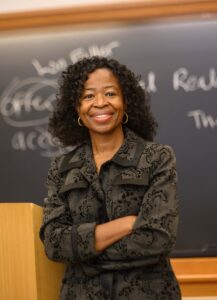 Prof. Ruth L. Okediji is the Jeremiah Smith. Jr, Professor of Law at Harvard Law School where she teaches Contracts, Intellectual Property (IP), and various courses in Biblical Law. Professor Okediji is co-Director of the Berkman Klein Center for Internet & Society, Director of the Harvard Global Access in Action (GAiA), Founder and Faculty Director of the Harvard Law School Program on Biblical Law & Christian Legal Studies, and until recently served as the Oppenheimer Professor and Faculty Director of the Harvard Center for African Studies. A renowned scholar and foremost authority in international IP law, Professor Okediji has led global research initiatives, negotiated international IP agreements on behalf of African countries and regional economic communities (RECs), served as an expert in international litigation (patent and copyright), and advised inter-governmental organizations and national governments on a range of matters related to IP and access to medicines, IP and technology regulation, innovation policy, and Artificial Intelligence (AI). Professor Okediji was a member of the United States National Academies’ Board on Science, Technology and Policy Committee on the Impact of Copyright Policy on Innovation in the Digital Era, and from 2020-2021 she co-Chaired the National Academies’ Committee on Advancing Commercialization of Digital Products from U.S. Federal Laboratories. She is the immediate past- President of the Order of the Coif and an elected member of the American Law Institute (ALI). In 2023, she was appointed to the American Bar Association’s Presidential Taskforce on Law and Artificial Intelligence. Professor Okediji is a recipient of numerous awards for excellence in teaching, research, and mentoring including a two-time recipient of the “Shatter the Ceiling” Award at Harvard Law School, and other awards such as “Outstanding Professor,” “Best Professor of the Year” and “Professor Most Likely to go Beyond the Call of Duty.” She is a 2024 recipient of the Barry Prize from the American Academy of Science & Letters and has been recognized as one of the top 50 people in the world in the field of intellectual property law. Professor Okediji serves on the editorial boards of the Journal of World Intellectual Property Law and the Journal of International Economic Law. A graduate of the University of Jos and Harvard Law School, she is licensed to practice in New York and Minnesota.
Prof. Ruth L. Okediji is the Jeremiah Smith. Jr, Professor of Law at Harvard Law School where she teaches Contracts, Intellectual Property (IP), and various courses in Biblical Law. Professor Okediji is co-Director of the Berkman Klein Center for Internet & Society, Director of the Harvard Global Access in Action (GAiA), Founder and Faculty Director of the Harvard Law School Program on Biblical Law & Christian Legal Studies, and until recently served as the Oppenheimer Professor and Faculty Director of the Harvard Center for African Studies. A renowned scholar and foremost authority in international IP law, Professor Okediji has led global research initiatives, negotiated international IP agreements on behalf of African countries and regional economic communities (RECs), served as an expert in international litigation (patent and copyright), and advised inter-governmental organizations and national governments on a range of matters related to IP and access to medicines, IP and technology regulation, innovation policy, and Artificial Intelligence (AI). Professor Okediji was a member of the United States National Academies’ Board on Science, Technology and Policy Committee on the Impact of Copyright Policy on Innovation in the Digital Era, and from 2020-2021 she co-Chaired the National Academies’ Committee on Advancing Commercialization of Digital Products from U.S. Federal Laboratories. She is the immediate past- President of the Order of the Coif and an elected member of the American Law Institute (ALI). In 2023, she was appointed to the American Bar Association’s Presidential Taskforce on Law and Artificial Intelligence. Professor Okediji is a recipient of numerous awards for excellence in teaching, research, and mentoring including a two-time recipient of the “Shatter the Ceiling” Award at Harvard Law School, and other awards such as “Outstanding Professor,” “Best Professor of the Year” and “Professor Most Likely to go Beyond the Call of Duty.” She is a 2024 recipient of the Barry Prize from the American Academy of Science & Letters and has been recognized as one of the top 50 people in the world in the field of intellectual property law. Professor Okediji serves on the editorial boards of the Journal of World Intellectual Property Law and the Journal of International Economic Law. A graduate of the University of Jos and Harvard Law School, she is licensed to practice in New York and Minnesota.
Health start-ups made in Africa: How can entrepreneurs fill in public health gaps?
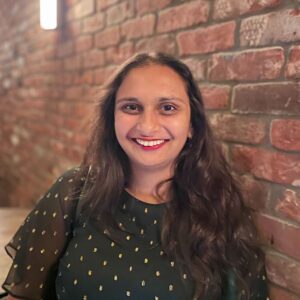 Natasha Mathur is the director of data at Maisha Meds, overseeing internal data analysis and infrastructure as well as developing collaborations with outside partners. Prior to this role Natasha worked in U.S. politics, first on Elizabeth Warren’s 2020 presidential campaign and later with early vote data on President Joe Biden’s 2020 campaign and the following Senate runoff election. Natasha has also served as the lead data scientist at Precision Strategies and previously worked at Deloitte. She holds a B.S. in Finance and Economics from NYU Stern and a M.S. in Public Policy & Computational Analysis from UChicago.
Natasha Mathur is the director of data at Maisha Meds, overseeing internal data analysis and infrastructure as well as developing collaborations with outside partners. Prior to this role Natasha worked in U.S. politics, first on Elizabeth Warren’s 2020 presidential campaign and later with early vote data on President Joe Biden’s 2020 campaign and the following Senate runoff election. Natasha has also served as the lead data scientist at Precision Strategies and previously worked at Deloitte. She holds a B.S. in Finance and Economics from NYU Stern and a M.S. in Public Policy & Computational Analysis from UChicago.
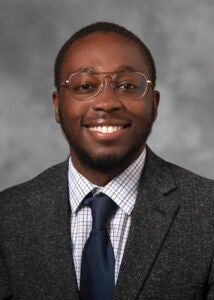 Osei Boateng is a dedicated healthcare professional with over five years of extensive experience in hospital administration and operations. His career spans notable institutions such as NewYork Presbyterian Hospital and the Henry Ford Health System. Presently, Osei is the visionary founder of OneHealth+, a cutting-edge digital platform introducing a revolutionary “healthpass” system. This platform enables users to effortlessly pay for healthcare services, whether for themselves or others, from any corner of the globe. OneHealth+ leverages the power of blockchain technology to ensure transparency, security, and efficiency in healthcare transactions. Beyond his professional achievements, Osei is also the driving force behind the OKB Hope Foundation, a nonprofit organization deeply committed to extending healthcare services to remote and underserved communities in Ghana. Osei holds a Bachelor of Science in Human Biology and Society, with minors in business and gerontology, and a Master’s in Healthcare Administration from Cornell University. He is currently working on a Master of Business Creation from Utah University.
Osei Boateng is a dedicated healthcare professional with over five years of extensive experience in hospital administration and operations. His career spans notable institutions such as NewYork Presbyterian Hospital and the Henry Ford Health System. Presently, Osei is the visionary founder of OneHealth+, a cutting-edge digital platform introducing a revolutionary “healthpass” system. This platform enables users to effortlessly pay for healthcare services, whether for themselves or others, from any corner of the globe. OneHealth+ leverages the power of blockchain technology to ensure transparency, security, and efficiency in healthcare transactions. Beyond his professional achievements, Osei is also the driving force behind the OKB Hope Foundation, a nonprofit organization deeply committed to extending healthcare services to remote and underserved communities in Ghana. Osei holds a Bachelor of Science in Human Biology and Society, with minors in business and gerontology, and a Master’s in Healthcare Administration from Cornell University. He is currently working on a Master of Business Creation from Utah University.
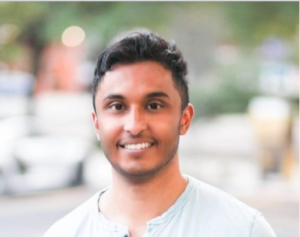 Sulav Singh is the founder and CEO of Vittas Inc – a company that uses machine learning to help hospitals and pharmacies access cheap and affordable loans used to support the purchase of medication and medical equipment. He has more than 5 years experience in leading companies in healthcare. He is allergic to conventional thinking and is an adventure seeker who thinks tackling the world’s social and environmental problems will be the next trillion dollar business. The eternal optimist.
Sulav Singh is the founder and CEO of Vittas Inc – a company that uses machine learning to help hospitals and pharmacies access cheap and affordable loans used to support the purchase of medication and medical equipment. He has more than 5 years experience in leading companies in healthcare. He is allergic to conventional thinking and is an adventure seeker who thinks tackling the world’s social and environmental problems will be the next trillion dollar business. The eternal optimist.
 Nasser Diallo is the Founder & CEO of Clinic+O, a social enterprise that builds technology-enabled primary care solutions to eliminate barriers to accessing quality healthcare for marginalized communities in West Africa. Before starting Clinic+O, Nasser worked as a Public Policy Analyst at Facebook where he helped design programs that support digital literacy, prevent internet shutdowns and stimulate the growth of the digital economy in sub-Saharan Africa. Nasser has a BA from The George Washington University, and Master’s degrees from Oxford University (UK) and Sciences Po (France). He is passionate about using digital technology to develop practical, cost-effective, and sustainable solutions that will improve health and wellbeing for communities across West Africa. Nasser is a member of the Obama Foundation Leaders Africa Program, Echoing Green and UNDP Digital Innovation Alumni.
Nasser Diallo is the Founder & CEO of Clinic+O, a social enterprise that builds technology-enabled primary care solutions to eliminate barriers to accessing quality healthcare for marginalized communities in West Africa. Before starting Clinic+O, Nasser worked as a Public Policy Analyst at Facebook where he helped design programs that support digital literacy, prevent internet shutdowns and stimulate the growth of the digital economy in sub-Saharan Africa. Nasser has a BA from The George Washington University, and Master’s degrees from Oxford University (UK) and Sciences Po (France). He is passionate about using digital technology to develop practical, cost-effective, and sustainable solutions that will improve health and wellbeing for communities across West Africa. Nasser is a member of the Obama Foundation Leaders Africa Program, Echoing Green and UNDP Digital Innovation Alumni.
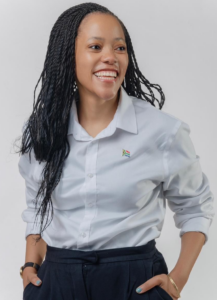 Mangaka Meso currently serves as the Executive Assistant to the Remgro Limited CEO. She joined the Remgro family in 2021, bringing with her diverse global experiences in the private sector and public service. Mangaka is a graduate of the University of Cape Town (UCT), and has also co-authored a research paper with our own Harvard Law School Professor, Professor David Wilkins. After university, she gained hands-on experience and understanding of the American political system while as a full-time volunteer for the Democratic Party on Hillary Clinton’s 2016 Presidential Campaign, living in Georgetown Washington DC. Following the end of the campaign, Mangaka went on to gain training in corporate law (M&A and Private Equity) at one of South-east Asia’s leading law firms, Shardul Amarchand Mangaldas & Co, based in Mumbai, in India. During this period, she (in addition to her legal training) completed a comprehensive and self-funded research project on the life of India’s former Supreme Court Chief Justice, P.N. Bhagwati, to better understand his philosophy and work. This provided her the privilege of extensive global travel and interviews with prominent global luminaries, such as the late Justice Ruth Bader Ginsburg, and Judge Stephen Breyer, who crossed paths with Justice, P.N. Bhagwati. Prior to joining Remgro, Mangaka co-founded a SA-China focussed investments consultancy, LehmanMeso, affiliated with the founders of the LehmanBush global consulting firm. Mangaka has the distinct honour of having her name engraved on the bricks laid outside the historic headquarters of Vital Voices Global Partnership (a women’s leadership organisation) in Washington D.C.
Mangaka Meso currently serves as the Executive Assistant to the Remgro Limited CEO. She joined the Remgro family in 2021, bringing with her diverse global experiences in the private sector and public service. Mangaka is a graduate of the University of Cape Town (UCT), and has also co-authored a research paper with our own Harvard Law School Professor, Professor David Wilkins. After university, she gained hands-on experience and understanding of the American political system while as a full-time volunteer for the Democratic Party on Hillary Clinton’s 2016 Presidential Campaign, living in Georgetown Washington DC. Following the end of the campaign, Mangaka went on to gain training in corporate law (M&A and Private Equity) at one of South-east Asia’s leading law firms, Shardul Amarchand Mangaldas & Co, based in Mumbai, in India. During this period, she (in addition to her legal training) completed a comprehensive and self-funded research project on the life of India’s former Supreme Court Chief Justice, P.N. Bhagwati, to better understand his philosophy and work. This provided her the privilege of extensive global travel and interviews with prominent global luminaries, such as the late Justice Ruth Bader Ginsburg, and Judge Stephen Breyer, who crossed paths with Justice, P.N. Bhagwati. Prior to joining Remgro, Mangaka co-founded a SA-China focussed investments consultancy, LehmanMeso, affiliated with the founders of the LehmanBush global consulting firm. Mangaka has the distinct honour of having her name engraved on the bricks laid outside the historic headquarters of Vital Voices Global Partnership (a women’s leadership organisation) in Washington D.C.
Digital & AI: The power of new tech for Africa
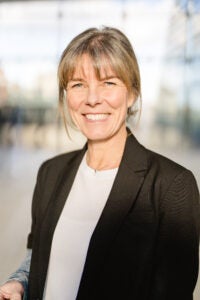 Dr. Kristina Wallengren, the Global CEO of THINK and a specialist in TB and HIV, brings over 30 years of experience in research and public health. She founded THINK in South Africa in 2013, a non-profit research and health impact organisation that has significantly influenced international standards in TB treatment and care. With a PhD from the Karolinska Institute and an MPH from Harvard, Dr. Wallengren’s expertise has been integral to the Global Fund Technical Review Panel and WHO epidemiological and programme review missions across Africa and Asia. Currently, she is pioneering AI to improve health programmes in Africa as part of THINK’s transformative agenda to leverage technology for health system strengthening in resource-limited settings.
Dr. Kristina Wallengren, the Global CEO of THINK and a specialist in TB and HIV, brings over 30 years of experience in research and public health. She founded THINK in South Africa in 2013, a non-profit research and health impact organisation that has significantly influenced international standards in TB treatment and care. With a PhD from the Karolinska Institute and an MPH from Harvard, Dr. Wallengren’s expertise has been integral to the Global Fund Technical Review Panel and WHO epidemiological and programme review missions across Africa and Asia. Currently, she is pioneering AI to improve health programmes in Africa as part of THINK’s transformative agenda to leverage technology for health system strengthening in resource-limited settings.
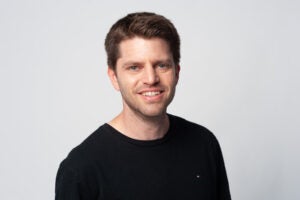 Ilai Soloducho is currently working in Google Labs on building cutting-edge generative AI capabilities to revolutionize the world of Software Engineering, after being part of X, the Moonshot Factory (aka Google X). Prior to Alphabet, Ilai worked in Palantir, a pioneering big-data company, helping Western governments and Fortune 500 enterprises solve their hardest problems using data. Ilai holds a Computer Science B.A. from Reichman University and a Master of Public Administration (MPA) from Harvard Kennedy School. He is also a board member at Sunrise, an NGO dedicated to improving the lives of children fighting cancer.
Ilai Soloducho is currently working in Google Labs on building cutting-edge generative AI capabilities to revolutionize the world of Software Engineering, after being part of X, the Moonshot Factory (aka Google X). Prior to Alphabet, Ilai worked in Palantir, a pioneering big-data company, helping Western governments and Fortune 500 enterprises solve their hardest problems using data. Ilai holds a Computer Science B.A. from Reichman University and a Master of Public Administration (MPA) from Harvard Kennedy School. He is also a board member at Sunrise, an NGO dedicated to improving the lives of children fighting cancer.
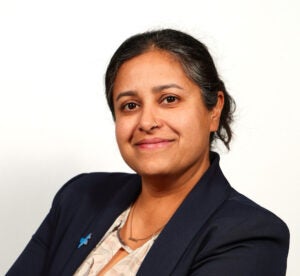 Dr. Sachita Shah is Sr. Director of Global Health and lead for Womens Health at Butterfly Network. As a Professor of Emergency Medicine and Adjunct Professor of Global health at University of Washington, the focus of her academic and research career over the past 15 years has been on the impact of point-of-care ultrasound in limited resource settings, with focus on how POCUS paired with training strengthens health systems. At Butterfly, she leads a team encouraging partnership with AI developers and in-house R&D around integration of deep-learning algorithms to make clinician-performed ultrasound even more accessible in resource-scarce areas of the world.
Dr. Sachita Shah is Sr. Director of Global Health and lead for Womens Health at Butterfly Network. As a Professor of Emergency Medicine and Adjunct Professor of Global health at University of Washington, the focus of her academic and research career over the past 15 years has been on the impact of point-of-care ultrasound in limited resource settings, with focus on how POCUS paired with training strengthens health systems. At Butterfly, she leads a team encouraging partnership with AI developers and in-house R&D around integration of deep-learning algorithms to make clinician-performed ultrasound even more accessible in resource-scarce areas of the world.
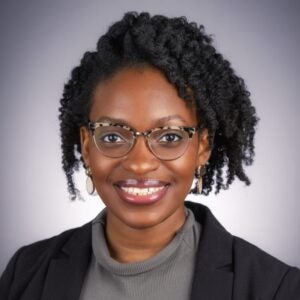 Dr. Chinasa T. Okolo, Ph.D. is a Fellow at The Brookings Institution and a recent Computer Science Ph.D. graduate from Cornell University. Her research focuses on AI governance in the Global South, human-centered approaches to AI explainability, and the future of data work. In addition to her work at Brookings, Dr. Okolo also serves as a Consulting Expert with the African Union, contributing to the development of the AU-AI Continental Strategy for Africa, and as an Ethics Advisor to the Equiano Institute, a research lab focused on steering safe and trustworthy AI in Africa. Her research has been covered widely in media outlets and published at top-tier venues in HCI and sociotechnical computing. Learn more about Dr. Chinasa T. Okolo at www.chinasatokolo.com.
Dr. Chinasa T. Okolo, Ph.D. is a Fellow at The Brookings Institution and a recent Computer Science Ph.D. graduate from Cornell University. Her research focuses on AI governance in the Global South, human-centered approaches to AI explainability, and the future of data work. In addition to her work at Brookings, Dr. Okolo also serves as a Consulting Expert with the African Union, contributing to the development of the AU-AI Continental Strategy for Africa, and as an Ethics Advisor to the Equiano Institute, a research lab focused on steering safe and trustworthy AI in Africa. Her research has been covered widely in media outlets and published at top-tier venues in HCI and sociotechnical computing. Learn more about Dr. Chinasa T. Okolo at www.chinasatokolo.com.
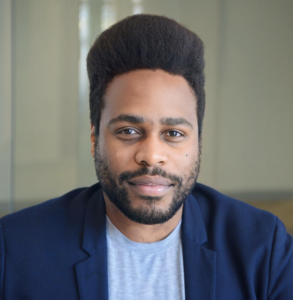 Khahlil Louisy (he/him) is a Senior Data-Smart Fellow at the Data-Smart City Solutions program at the Bloomberg Center for Cities at Harvard University and a former Technology & Human Rights Fellow at the Carr Center for Human Rights Policy at the Harvard Kennedy School. Khahlil is an applied economist focused on issues of public and global health, economic development, and technology and innovation. His work centers on the development and application of technologies for public purpose, while researching their implications for issues of inequality, health outcomes, and human rights. He is the former head of global implementation at PathCheck Foundation – an organization founded at the Massachusetts Institute of Technology to develop novel technologies in response to health emergencies. He currently serves as president of the Institute for Technology & Global Health and co-head of Artificial Intelligence and Technology in Public Health within the joint World Health Organization and International Telecommunications Union initiative on Artificial Intelligence for Health. His work has spanned several countries globally and he remains committed to issues of equality, equity, and global poverty.
Khahlil Louisy (he/him) is a Senior Data-Smart Fellow at the Data-Smart City Solutions program at the Bloomberg Center for Cities at Harvard University and a former Technology & Human Rights Fellow at the Carr Center for Human Rights Policy at the Harvard Kennedy School. Khahlil is an applied economist focused on issues of public and global health, economic development, and technology and innovation. His work centers on the development and application of technologies for public purpose, while researching their implications for issues of inequality, health outcomes, and human rights. He is the former head of global implementation at PathCheck Foundation – an organization founded at the Massachusetts Institute of Technology to develop novel technologies in response to health emergencies. He currently serves as president of the Institute for Technology & Global Health and co-head of Artificial Intelligence and Technology in Public Health within the joint World Health Organization and International Telecommunications Union initiative on Artificial Intelligence for Health. His work has spanned several countries globally and he remains committed to issues of equality, equity, and global poverty.
Lessons learned: Safeguarding Africa’s health security & preparing for the next pandemic
Dr. Degefa Uma Banti, B.Pharm, MD, MPH, is a Senior Supply Chain Advisor at Ethiopian Pharmaceutical Supply Service (EPSS) where he oversees overall supply chain operations to enhance operation efficiency and effectiveness. He also provides technical lead to Deliverology Unit for Supply Chain Health System Strengthening. Prior to his current role, Dr. Degefa worked as a General Medical Practitioner at Ambo University Referral Hospital and Tirunesh Bejing General Hospital. He was also the Head of Pharmacy unit, Secretory of Drug and Therapeutic Committee, and Focal of Drug Information System at Ambo General Hospital. Dr. Degefa was Founders and Manager of Ambo – Koo Pharmacy. He is a member of Ethiopian Pharmacy Association (EPA), Ethiopian Medical Association (EMA), and Oromia Physician Association (OPA). Dr. Degefa has over 16 years’ experience of pharmacy, clinical and public health practices. He is a fellow of MSc in Health Supply Chain Management at Addis Ababa University.
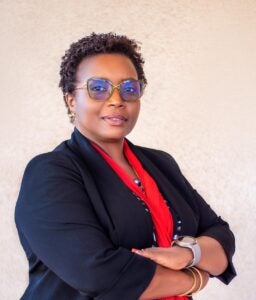 Dr. Ellen Mkondya-Senkoro is a renowned leader in the public health, with over 28 years of experience working in the United Republic of Tanzania. She boasts of a three-dimension understanding of the Tanzania’s health sector with a rare blend of experiences from working with the Ministry of Health, multilateral organization, and Non-Government Organization (NGO). Currently works as the Chief Executive Officer (CEO) of the Benjamin William Mkapa Foundation – founded by the late Former President of Tanzania. Dr. Ellen is a Medical Doctor by profession with a master’s degree in public health and an award recipient of Honorary Doctorate of Science D.Sc ( Honoris Causa) bestowed upon by The Hubert Kairuki Memorial University- Tanzania on the massive wide-ranging contribution and success in the health sector. She has also been recognized as one of the 100 changemakers of Tanzania in year 2023.
Dr. Ellen Mkondya-Senkoro is a renowned leader in the public health, with over 28 years of experience working in the United Republic of Tanzania. She boasts of a three-dimension understanding of the Tanzania’s health sector with a rare blend of experiences from working with the Ministry of Health, multilateral organization, and Non-Government Organization (NGO). Currently works as the Chief Executive Officer (CEO) of the Benjamin William Mkapa Foundation – founded by the late Former President of Tanzania. Dr. Ellen is a Medical Doctor by profession with a master’s degree in public health and an award recipient of Honorary Doctorate of Science D.Sc ( Honoris Causa) bestowed upon by The Hubert Kairuki Memorial University- Tanzania on the massive wide-ranging contribution and success in the health sector. She has also been recognized as one of the 100 changemakers of Tanzania in year 2023.
 Professor Adam Kamradt-Scott is the Dr Jiang Yanyong Visiting Professor of Global Health Security at the Harvard T.H. Chan School of Public Health. Adam’s research, teaching, and policy engagement work explores how governments and multilateral organisations respond to adverse health events such as epidemics, pandemics, and emerging health and security challenges. His most recent research has focused on civil-military cooperation in health and humanitarian crises, and the adoption of international legal instruments for health. Prior to entering academia, Adam’s background includes having worked as a health professional specialising in emergency care and clinical risk management, a political adviser, and a public servant in national pandemic preparedness, and he holds formal academic qualifications in health, international relations, and international law. More recently, he has served as a consultant to the Australian Government and the World Bank on pandemic preparedness and the COVID-19 response, and he is continuing to advise the Australian Government on the latest proposed changes to the International Health Regulations and the pandemic treaty. Adam is the co-founder and convenor of the Global Health Security conferences and currently serves as the Chair of the Board of Directors for the Global Health Security Network, a multidisciplinary professional association dedicated to promoting evidence-based policies to improve health outcomes.
Professor Adam Kamradt-Scott is the Dr Jiang Yanyong Visiting Professor of Global Health Security at the Harvard T.H. Chan School of Public Health. Adam’s research, teaching, and policy engagement work explores how governments and multilateral organisations respond to adverse health events such as epidemics, pandemics, and emerging health and security challenges. His most recent research has focused on civil-military cooperation in health and humanitarian crises, and the adoption of international legal instruments for health. Prior to entering academia, Adam’s background includes having worked as a health professional specialising in emergency care and clinical risk management, a political adviser, and a public servant in national pandemic preparedness, and he holds formal academic qualifications in health, international relations, and international law. More recently, he has served as a consultant to the Australian Government and the World Bank on pandemic preparedness and the COVID-19 response, and he is continuing to advise the Australian Government on the latest proposed changes to the International Health Regulations and the pandemic treaty. Adam is the co-founder and convenor of the Global Health Security conferences and currently serves as the Chair of the Board of Directors for the Global Health Security Network, a multidisciplinary professional association dedicated to promoting evidence-based policies to improve health outcomes.
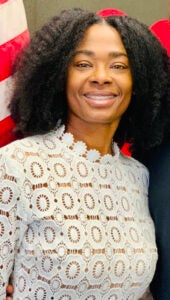 Dr Belizaire has 19 years of experience responding to outbreaks and other significant emergencies across continents. She has devoted her career to build resilient health system using health emergencies as an anchor. Dr Bélizaire has a medical background, a clinical specialisation, five master’s degrees including epidemiology, public health, and business administration. She is currently running the Harvard LEAD Fellowship cohort 2023-2024. Dr Bélizaire joined WHO in 2015 and has held various positions within WHO, from team leader of the Health Emergency Programme in Mauritania, incident manager of large and complex outbreaks in many countries, to COVID-19 coordination, and Emergency Preparedness lead in the Central African Republic. Dr Bélizaire has extensive experience in endemic disease response, acute event management, community health, and policy and strategy development, including in humanitarian, fragile, and insecure contexts. She has demonstrated leadership in emergency response with a solid commitment to saving lives and has led several response teams to high-performance levels since 2005. She has strengthened emergency preparedness and health system resilience in several African, European, and American countries.
Dr Belizaire has 19 years of experience responding to outbreaks and other significant emergencies across continents. She has devoted her career to build resilient health system using health emergencies as an anchor. Dr Bélizaire has a medical background, a clinical specialisation, five master’s degrees including epidemiology, public health, and business administration. She is currently running the Harvard LEAD Fellowship cohort 2023-2024. Dr Bélizaire joined WHO in 2015 and has held various positions within WHO, from team leader of the Health Emergency Programme in Mauritania, incident manager of large and complex outbreaks in many countries, to COVID-19 coordination, and Emergency Preparedness lead in the Central African Republic. Dr Bélizaire has extensive experience in endemic disease response, acute event management, community health, and policy and strategy development, including in humanitarian, fragile, and insecure contexts. She has demonstrated leadership in emergency response with a solid commitment to saving lives and has led several response teams to high-performance levels since 2005. She has strengthened emergency preparedness and health system resilience in several African, European, and American countries.
